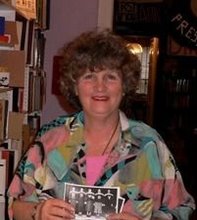

When I was in New York last year, Mark Levy, a civil rights veteran of the 1960s, was launching a history project to commemorate the Queens College students who had participated in the Civil Rights movement. Two of these students, Andrew Goodman and Michael Schwerner, were murdered because of their civil rights activism, along with a young African-American civil rights worker from Mississippi, James Chaney. In May of 2009, these aging comrades marched in the graduation ceremony. Carl Hirsch and I could not be there but Mark sent us our sashes and these images resulted. We all have many love stories in our lives and this is one of mine:
From the Introduction to Sister and Brother: Lesbians and Gay Men Write about Their Lives Together, edited with John Preston. The book is now out of print.
My own relationship with gay men began in 1959 when I found myself on the campus of Queens College, part of the City University of New York. Here in this working-class "Berkeley of the East," I met Carl, the son of a trade unionist who had been purged from the union he had helped to organize in the first wave of red bashing in the 1940s. Tall, broad, with a permanent cowlick over his forehead, Carl was part of a whole family of red diaper babies who still believed in the vision of the International. The group of committed activists gave my own class anger a historical setting; my first date with Carl was to see Lotte Lenya portray Jennie in Brecht and Weill's "Threepenny Opera" in a small Village theater. Afterward we sat in a huge and sparsely populated automate where he explained Brecht's vision of the theater to me, the coffee cups piling up and the ashtray spilling over.
That night we attempted to make love as my mother slept in the next room. I was naked, and Carl was stroking me, when my mother sleepwalked into the room. Carl threw his body over mine, and I said in a stern voice, "Mother, go back to sleep." Obediently, she turned herself around and marched out the way she had come in.
"What will I tell her in the morning?" I wondered out loud to Carl.
"Tell her," he said quietly, "we were trying to find each other."
All night we talked until the Queens sky turned orange with the new day; I still wanted Carl to make love to me, but I already knew that my womanness was not a softness that he sought.
We kept our erotic searchings to ourselves while Carl and the others continued my cultural and political education; songs and voices filled my heart--Martha Schlamme, her voice heavy with European history, singing "Peat Bog Soldiers"; Pete Seeger, his head held high, singing "The Banks are Made of Marble"; Odetta, like a reincarnation of Paul Robeson, making us believe in an international community of peace. We organized, petitioned, rode buses to Washington, picketed the Flushing, Queens Woolworth for its discriminatory racial policies, rode Freedom buses to Baltimore and attempted to integrate restaurants and luncheonettes. We refused to take shelter during air-raid drills and had our college IDs confiscated by the campus police; we shut down the school to protest the Vietnam War.
I am still inspired and haunted by the memories of that time; by the maliciousness of the McCarthy era; by the courage of the then young people like Paul Robeson Jr. and Jo-Anne Grant, who were called before the House Un-American Activities Committee because of their unauthorized travel to China; by our insistence to support them, to be present in that hearing room that really was a courtroom, a conviction chamber. And while Carl and I did these actions together, while he taught me about the long tradition of radical protest in this country, we both went our separate ways in the night, to differently fleshed worlds.
In 1963, I left this country to travel in Europe with my woman lover. When I returned, things had changed. My friends interpreted my going as a betrayal of Carl; male homosexuality was easier for them to understand than my lesbianism, I suspect. I became more and more involved in Greenwich Village bar life, while continuing my own involvement in the Civil Rights movement. Carl want away to graduate school; we wrote each other long letters giving each the courage to explore our queerness. Carl was looking for a home with an older man. I wanted sex, street wanderings. I found the Gay Liberation movement. This past year [1994] once again I was in Washington, along with thousands of other gay and lesbian people, demonstrating for a more compassionate, inclusive American society. As I marched in the Lesbian Herstory Archives contingent down a long wide avenue, Carl jumped out of the crowd and ran over to me. Still large, still in his suspenders and a white shirt, he hugged me and I thumped his chest. Through all the emotional commotion of our reunion, we never missed a step as a whole nation of lesbian and gay people walked into history.
And here we are again, old friends, bodies marked by the passing of the years, but know that the songs once sung in the name of another social vision many years ago still sing within us.

1 comment:
This is beautiful Joan. I write Lesbian Romances, and my next book has two gay male side characters. One friend said "maybe you should make them women instead. Your readers (i.e. lesbians) don't want to read about men." I did not change them, and I will not change them. I can't imagine my life without my gay friends and I will not write my books without them. The next time someone suggests I take the men out of my life (not likely since I am also the mother of a young son) I will point her to this blog.
Rachel
Post a Comment